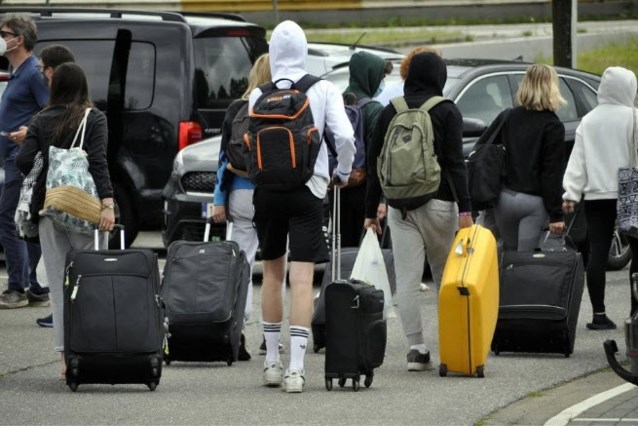The number of coronavirus infections in the Brussels-Capital Region is rising, especially among young people and returning travellers, according to Inge Neven, head of the Brussels Health Inspectorate.
The positive rate in Brussels increased to 4.7%, compared to 3.2% two weeks ago, and the incidence rate (confirmed cases per 100,000 people over 14 days) has more than doubled in two weeks.
The Brussels health authorities also note increases in hospital admissions - both for regular and intensive care - and in deaths (three deaths over seven days), but added that the situation remains under control.
Non-vaccinated young people
Recently, most infections are detected in the age group of 20-29 year-olds, followed by 30-39 year-olds, and then 10-19 year-olds, Neven said on Tuesday at the weekly press conference about Brussels' epidemiological situation.
"We have had the biggest increase in cases - although less in absolute terms - in the youngest age group between 0 and 9 years, with positive cases tripling in the last week," she added.
"In comparison to other large cities, proportionally we have a very young population, which is less vaccinated, but our most at-risk population is really well vaccinated," Neven said.
Related News
- 1,000 Brussels residents who were vaccinated abroad now also registered
- Brussels largest vaccination centre closes its doors today
- Vaccination rates for healthcare workers still unknown
More than 80% of those aged 65 and over, more than 70% of those aged 45-64, more than 50% of those aged 25-34, and only more than 35% of those aged 18-24 have received at least a first vaccine dose.
Over the past few weeks, Neven has been stressing the importance of vaccinating young people to achieve herd immunity and reach the 70% threshold of fully vaccinated residents.
The Brussels authorities are trying to encourage people using a variety of social media, posters, campaigns running in the municipalities, vaccination buses stationed in the most precarious neighbourhoods, and by working closing with religious leaders, as well as informal leaders to convince people.
Earlier in the Brussels vaccination campaign, the same strategy was used for the older population as well, and the degree of protection increased considerably, leading Neven to hope that the same will happen for the younger people - albeit with a slight delay.
Returning travellers
Besides young people, the positivity rate among people returning from travel is also higher than among those leaving, meaning that the virus is being brought back from abroad, whilst also circulating in Belgium simultaneously.
This is particularly true in Brussels, which is the region with the highest number of people returning from abroad, according to Neven.
Most holidaymakers, however, respect the obligation to be tested on day 1 of their return and "a third of positive cases come from travellers returning home," she stressed.
However, the authorities "are also aware that not everyone complies with the requirement to complete the Passenger Locator Form (PLF)," and that this figure is an underestimate as only the red zones are subject to mandatory testing.
Additionally, a significant proportion of travellers only test positive a few days after their return, meaning that those infections are not detected by the day 1 test.
Neven also called on people to be fully vaccinated before leaving, to respect the basic measures (masks, social distance, hand hygiene) on holiday, and to avoid red zones, even though the absolute number of travellers returning from red zones has almost tripled compared to the beginning of July.
Additionally, she recommends quarantining upon return, and watching for symptoms during the incubation period, which lasts up to ten days, even for those who are fully vaccinated.
"When you come back, you should avoid visiting your grandparents in a nursing home, for example," Neven added, referring to a few cases in nursing homes in Wallonia and Flanders.

